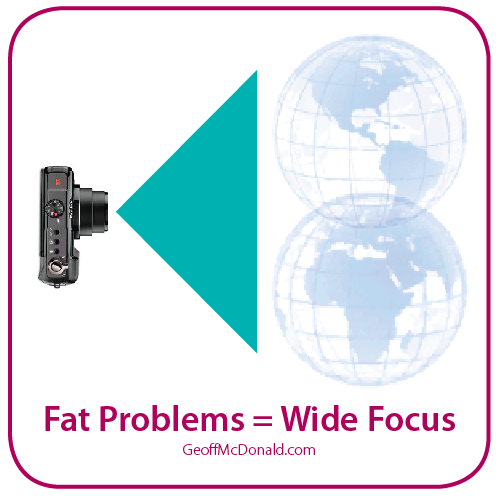
WE prefer skinny problems
Our thinking uses up so much energy, our brains have evolved to use shortcuts. As a result our brains are lazy – they look for predictable or easy solutions. Therefore we naturally prefer skinny problems. And one of our weaknesses is that we often see fat problems in skinny ways. This doesn’t work very well for the following reasons…
Less easily solved
Skinny problems are easy. Fat ones are not. Think of a complex maths problem. It’s solve-able and not easily.
Cause and Effect are NOT obvious
With Fat Problems, it’s not so easy to see what is causing the effect. With terrorism and the events of 9/11, it was clearly caused by a bunch of guys hijacking a plane and crashing it into a building. Whilst tracking down those responsible is part of a short-term solution, it may not prevent a similar event from occurring again. The real question to ask is: What motivated them to do it? When you find the source, you can solve the problem more effectively.
Involves multiple Domains
In the case of terrorism, it’s not just a political and military problem, it’s also a social one. Plus, it’s a global issue that involves different cultures, laws in different countries, different languages and different religious beliefs. A complex melting pot!
[Tweet “What’s the difference between a Skinny Problem and a Fat Problem?”]
Fat Problems require a wider view
Fat Problems are not solved by Skinny Thinking.
Skinny Thinking is like using a telephoto lens. It allows you to get up close and it narrows your attention.
In contrast, Fat Thinking requires a wide-angle lens. It allows you to have a wider, more distant view. This way we see more of the context or landscape in which the subject is standing in.
When faced with a problem we need to choose what to focus on. Think of it as framing your photo. Do you want a close up of the subject’s face with no background? Or, do you want their entire body standing in the wider landscape? Are you focusing on the forest or the trees?
Source: Book Rapper, Wicked Thinking. Derived from Eric Knight’s book Reframe.



